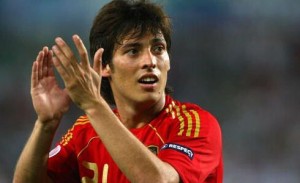
After Spain equalled the record held by Holland and France of 14 consecutive victories in official competition with their comfortable 3-1 win against Scotland on Wednesday, among the many platitudes meted out by players and staff of La Roja was a rather frank appraisal by Santi Cazorla.
“The way we are playing at the moment we are favourites to win the European Championship,” the Málaga midfielder said in an unusual instance of a footballer voicing an opinion. It was a far cry from the standard Spanish players’ fare of slightly awkward modesty and explaining to the camera that it’s one game at a time.
But Cazorla is quite correct. Spain will be the overwhelming favourite when the finals commence in Poland and Ukraine next summer, despite Germany and Holland matching their qualification record of winning every game. Spain have been beaten only twice in competitive matches since a 1-0 loss to Romania in 2006 – at the Confederations Cup by the USA and against Switzerland in the opening match of the 2010 World Cup.
They have had a torrid recent time in friendlies, getting thrashed first by Argentina and then Portugal, and also losing to Italy, but non-competitive games often mean squad rotation and the number of fixtures the Spanish FA has been cranking out to line its coffers on the backs of the world champions has probably dampened enthusiasm for the lucrative world tour.
But when the game is competitive, Spain are practically unbeatable. And there is a good reason why they are more so at the moment. Not so much because of the extraordinary talent of the first 11, but because of the extraordinary talent across the Spanish league and the eagerness with which coach Vicente del Bosque roots it out. Since taking charge of the national side in 2008, the meticulous Manchegan has given debuts to 21 different players, the latest of these, Valencia’s Jordi Alba, as a reconverted left back against Scotland.
Coaxing Thiago Alcântara, a Brazilian, into the full Spain side was a foregone conclusion – the Barcelona winger has lived in the country since childhood – but Del Bosque even went as far as to inquire whether Seville’s Argentinean forward Diego Perotti may like to join up as well.
While other nations rely overly on fading stars, Del Bosque has been comparatively ruthless with the likes of Marcos Senna, Carlos Marchena, Joan Capdevila and, more recently, even the misfiring Fernando Torres. When quizzed on the state of the Chelsea forward’s form, Del Bosque made no assurances that he would take the former Atlético man to the 2012 finals. Instead he stated simply that those players in the keenest form would board the plane.
Only a bit-part for the sublime Silva
Neither is there a great deal of sentiment for those players that don’t get as much field time as they would like; Víctor Valdés made his first competitive start for Spain against Scotland at the age of 29 and David Silva, so sublime in the same game and one of the finest midfielders in the world, recently described himself as a bit-part player for La Roja. After the loss to Switzerland in South Africa, Del Bosque realised he needed to alter the shape of the team and sacrificed the Canarian, who played just five more minutes during the competition.
There is a reason that Spain keep winning, and a large part of that is the ability of their coach to mould his players according to each individual opponent. His readiness to bring in new faces means Spain are constantly being refreshed and even a side made up of their reserves would be capable of cutting a swathe through Poland and Ukraine.
Cazorla may have been presumptuous in stating Spain are the clear favourite to win the tournament, but he was also right on the mark. It will be up to other nations to find a way to prove him wrong.
Leave a Reply
You must be logged in to post a comment.